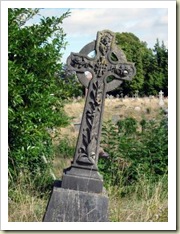 Easter was not over last Sunday. According to church liturgy, there are seven Sundays in the Easter season, not just one. So what's the rest of the Easter story? Mark's Gospel gives the shortest account of that first Easter Sunday morning, but it gives an important clue to the rest of the story, and it's not what one might expect!
Easter was not over last Sunday. According to church liturgy, there are seven Sundays in the Easter season, not just one. So what's the rest of the Easter story? Mark's Gospel gives the shortest account of that first Easter Sunday morning, but it gives an important clue to the rest of the story, and it's not what one might expect!
Mark 16:1 When the Sabbath was over, Mary Magdalene, Mary the mother of James, and Salome bought spices so that they might go to anoint Jesus' body. 2 Very early on the first day of the week, just after sunrise, they were on their way to the tomb 3 and they asked each other, "Who will roll the stone away from the entrance of the tomb?"
4 But when they looked up, they saw that the stone, which was very large, had been rolled away. 5 As they entered the tomb, they saw a young man dressed in a white robe sitting on the right side, and they were alarmed.
6 "Don't be alarmed," he said. "You are looking for Jesus the Nazarene, who was crucified. He has risen! He is not here. See the place where they laid him. 7 But go, tell his disciples and Peter, 'He is going ahead of you into Galilee. There you will see him, just as he told you.' "
8 Trembling and bewildered, the women went out and fled from the tomb. They said nothing to anyone, because they were afraid.
That's it! That is actually how the Gospel of Mark ends! In fear and failure. No triumphant resurrection story here. No restoration of the eleven and multitude of disciples who abandoned Jesus in his darkest hours. Nothing like that, just a few fearful women hearing the resurrection announcement, but failing to tell anyone.
But you say, wait, my Bible has more verses; it doesn't end there! It’s true, most Bibles, for example the NIV, have another 12 verses which definitely give the gospel a smoother ending, more like we find in Matthew and Luke. However, just as the NIV points out, “The earliest manuscripts and some other ancient witnesses do not have Mark 16:9-20,” so it is that we know conclusively that Mark did not pen this ending. His writing so far as we know today ends at verse 8, as quoted above. Verses 9-20 represent an early attempt to finish the story, to give Mark an ending just like Matthew and Luke. And we know these verses are truthful, but still we also know they are not authentically written by Mark. What can we make of the authentic ending of Mark's Gospel (16:1-8)?
Isn't it ironic? Don't you think? “They said nothing to anyone.” All through Mark's gospel, people are told by Jesus not to tell anyone about what he has just done, but they immediately disobey and go tell everyone! For example, Jesus heals a man: Immediately the leprosy left him and he was cleansed. Jesus sent him away at once with a strong warning: "See that you don't tell this to anyone." .... Instead he went out and began to talk freely, spreading the news. (Mark 1:43b, 44a, 45a)
We may question why Jesus frequently gave this command, why he didn't want too many people discovering who he was, why he didn't want a frenzied mob constantly pursuing him. We do know that in chapter 9, Jesus tells his disciples not to tell anyone until he had been raised from the dead. It is the death and resurrection of Jesus which makes sense of everything else Jesus did. And now, in chapter 16, that time has come! Jesus has been resurrected, but the women are silent. Jesus' repeated command “Say nothing to anyone” is almost exactly what Mark says of the women, “they said nothing to anyone.” It's Mark's final irony.
Yes, we know that they did get over their fear, and they did tell the other disciples, and they were so effective at telling the disciples that over 500 of them gathered together 40 days later and saw Jesus ascend into heaven just after giving his final words to go and tell everyone. Why didn’t Mark tell the rest of the story like Matthew and Luke?
Why end the story unresolved as Mark does? In what I think is an incredibly great book on reading this gospel, Mark As Story, the authors say this about the ending:
It cries out for a resolution, cries out for the hope that someone will proclaim the good news. And who is left at the end of the story to do this? Not Jesus. Not the disciples. Not the women who fled the grave. Only the readers are left to complete the story! (pg. 143)
The rest of the story depends on us, not them. Mark 1:1 claimed that this gospel was the beginning of the good news about Jesus the Messiah. The rest of the story is up to you and me. Just as it did not end with the fear and failure of the women, so it does not end even with our fear and failure. Jesus does not give up on us when we fail him. That’s just the beginning of the gospel, there’s more to be told! He's not finished with any of us. This great news of life in Christ will continue to change people’s lives forever as we share it with them, in spite of our fears and failures.
I was reminded of this unending Easter story the other day in  Starbucks when I read my cup’s “The Way I See It”:
Starbucks when I read my cup’s “The Way I See It”:
There is no end to a story—it goes on indefinitely into eternity. Every time a story is read, it’s alive and it’s different because the reader is different.
—Alice Hoffman
Related Sermon
The Rest of the Story
The ironic ending of Mark's Gospel (16:1-9) invites us to continue the story where Jesus’ first disciples left off. The gospel of Jesus Christ continues to transform lives as it is told.
No comments:
Post a Comment